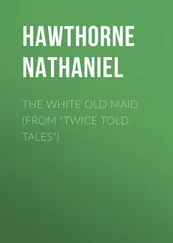“There is the garden, — the flowers to be taken care of,” observed Phoebe. “I should keep myself healthy with exercise in the open air.”
“And, after all, child,” exclaimed Hepzibah, suddenly rising, as if to dismiss the subject, “it is not for me to say who shall be a guest or inhabitant of the old Pyncheon House. Its master is coming.”
“Do you mean Judge Pyncheon?” asked Phoebe in surprise.
“Judge Pyncheon!” answered her cousin angrily. “He will hardly cross the threshold while I live! No, no! But, Phoebe, you shall see the face of him I speak of.”
She went in quest of the miniature already described, and returned with it in her hand. Giving it to Phoebe, she watched her features narrowly, and with a certain jealousy as to the mode in which the girl would show herself affected by the picture.
“How do you like the face?” asked Hepzibah.
“It is handsome! — it is very beautiful!” said Phoebe admiringly. “It is as sweet a face as a man’s can be, or ought to be. It has something of a child’s expression, — and yet not childish, — only one feels so very kindly towards him! He ought never to suffer anything. One would bear much for the sake of sparing him toil or sorrow. Who is it, Cousin Hepzibah?”
“Did you never hear,” whispered her cousin, bending towards her, “of Clifford Pyncheon?”
“Never. I thought there were no Pyncheons left, except yourself and our cousin Jaffrey,” answered Phoebe. “And yet I seem to have heard the name of Clifford Pyncheon. Yes! — from my father or my mother; but has he not been a long while dead?”
“Well, well, child, perhaps he has!” said Hepzibah with a sad, hollow laugh; “but, in old houses like this, you know, dead people are very apt to come back again! We shall see. And, Cousin Phoebe, since, after all that I have said, your courage does not fail you, we will not part so soon. You are welcome, my child, for the present, to such a home as your kinswoman can offer you.”
With this measured, but not exactly cold assurance of a hospitable purpose, Hepzibah kissed her cheek.
They now went below stairs, where Phoebe — not so much assuming the office as attracting it to herself, by the magnetism of innate fitness — took the most active part in preparing breakfast. The mistress of the house, meanwhile, as is usual with persons of her stiff and unmalleable cast, stood mostly aside; willing to lend her aid, yet conscious that her natural inaptitude would be likely to impede the business in hand. Phoebe and the fire that boiled the teakettle were equally bright, cheerful, and efficient, in their respective offices. Hepzibah gazed forth from her habitual sluggishness, the necessary result of long solitude, as from another sphere. She could not help being interested, however, and even amused, at the readiness with which her new inmate adapted herself to the circumstances, and brought the house, moreover, and all its rusty old appliances, into a suitableness for her purposes. Whatever she did, too, was done without conscious effort, and with frequent outbreaks of song, which were exceedingly pleasant to the ear. This natural tunefulness made Phoebe seem like a bird in a shadowy tree; or conveyed the idea that the stream of life warbled through her heart as a brook sometimes warbles through a pleasant little dell. It betokened the cheeriness of an active temperament, finding joy in its activity, and, therefore, rendering it beautiful; it was a New England trait, — the stern old stuff of Puritanism with a gold thread in the web.
Hepzibah brought out some old silver spoons with the family crest upon them, and a china tea-set painted over with grotesque figures of man, bird, and beast, in as grotesque a landscape. These pictured people were odd humorists, in a world of their own, — a world of vivid brilliancy, so far as color went, and still unfaded, although the teapot and small cups were as ancient as the custom itself of tea-drinking.
“Your great-great-great-great-grandmother had these cups, when she was married,” said Hepzibah to Phoebe. “She was a Davenport, of a good family. They were almost the first teacups ever seen in the colony; and if one of them were to be broken, my heart would break with it. But it is nonsense to speak so about a brittle teacup, when I remember what my heart has gone through without breaking.”
The cups — not having been used, perhaps, since Hepzibah’s youth — had contracted no small burden of dust, which Phoebe washed away with so much care and delicacy as to satisfy even the proprietor of this invaluable china.
“What a nice little housewife you are!” exclaimed the latter, smiling, and at the same time frowning so prodigiously that the smile was sunshine under a thunder-cloud. “Do you do other things as well? Are you as good at your book as you are at washing teacups?”
“Not quite, I am afraid,” said Phoebe, laughing at the form of Hepzibah’s question. “But I was schoolmistress for the little children in our district last summer, and might have been so still.”
“Ah! ‘tis all very well!” observed the maiden lady, drawing herself up. “But these things must have come to you with your mother’s blood. I never knew a Pyncheon that had any turn for them.”
It is very queer, but not the less true, that people are generally quite as vain, or even more so, of their deficiencies than of their available gifts; as was Hepzibah of this native inapplicability, so to speak, of the Pyncheons to any useful purpose. She regarded it as an hereditary trait; and so, perhaps, it was, but unfortunately a morbid one, such as is often generated in families that remain long above the surface of society.
Before they left the breakfast-table, the shop-bell rang sharply, and Hepzibah set down the remnant of her final cup of tea, with a look of sallow despair that was truly piteous to behold. In cases of distasteful occupation, the second day is generally worse than the first. We return to the rack with all the soreness of the preceding torture in our limbs. At all events, Hepzibah had fully satisfied herself of the impossibility of ever becoming wonted to this peevishly obstreperous little bell. Ring as often as it might, the sound always smote upon her nervous system rudely and suddenly. And especially now, while, with her crested teaspoons and antique china, she was flattering herself with ideas of gentility, she felt an unspeakable disinclination to confront a customer.
“Do not trouble yourself, dear cousin!” cried Phoebe, starting lightly up. “I am shopkeeper to-day.”
“You, child!” exclaimed Hepzibah. “What can a little country girl know of such matters?”
“Oh, I have done all the shopping for the family at our village store,” said Phoebe. “And I have had a table at a fancy fair, and made better sales than anybody. These things are not to be learnt; they depend upon a knack that comes, I suppose,” added she, smiling, “with one’s mother’s blood. You shall see that I am as nice a little saleswoman as I am a housewife!”
The old gentlewoman stole behind Phoebe, and peeped from the passageway into the shop, to note how she would manage her undertaking. It was a case of some intricacy. A very ancient woman, in a white short gown and a green petticoat, with a string of gold beads about her neck, and what looked like a nightcap on her head, had brought a quantity of yarn to barter for the commodities of the shop. She was probably the very last person in town who still kept the time-honored spinning-wheel in constant revolution. It was worth while to hear the croaking and hollow tones of the old lady, and the pleasant voice of Phoebe, mingling in one twisted thread of talk; and still better to contrast their figures, — so light and bloomy, — so decrepit and dusky, — with only the counter betwixt them, in one sense, but more than threescore years, in another. As for the bargain, it was wrinkled slyness and craft pitted against native truth and sagacity.
Читать дальше












